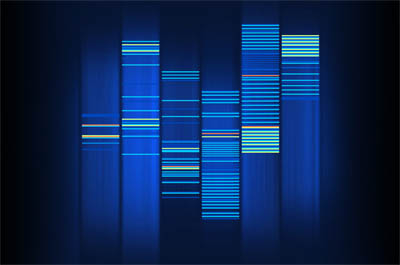If evolution is outlawed, only outlaws will evolve. – Jello Biafra
 ideonexus’ DNA Via: baekdal |
California has joined New York in taking stand against home DNA testing, issuing 13 cease and desist letters to companies offering home genetic tests. In addition to the companies being required to meet safety and testing standards (which nobody has an issue with), now consumers must provide a prescription from a doctor before a company can process a home DNA kit.
The only argument I’ve heard for why California and New York would want to restrict this service is that DNA is medical data. Only medical doctors know how to interpret DNA, and there are health hazards to people self-diagnosing based on such a complex wealth of information.
Newsweek has several comments supporting regulations such as these from Medical experts and Academics, which immediately sets off alarm bells in my mind. The experts and academics are arguing that they should be the only ones interpreting this data, and the rest of us need to pay them gobs and gobs of money for the service.
Gee, there’s nothing suspicious about that. Right?
Except that, according to the National Human Genome Research Institute’s
Promoting Safe and Effective Genetic Testing in the United States report, these “experts” are pretty clueless themselves:
Despite remarkable progress much remains unknown about the risks and benefits of genetic testing:
- No effective interventions are yet available to improve the outcome of most inherited diseases.
- Negative (normal) test results might not rule out future occurrence of disease.
- Positive test results might not mean the disease will inevitably develop.
It is primarily in the context of their unknown potential risks and benefits that the Task Force considers genetic testing.
So only an expert is allowed to interpret the results of our personal genome tests, but the experts don’t really know too much about them either. Of course they won’t know too much about them because the human genome is massively complex and new research emerges about its contents on a weekly basis.
Your doctor isn’t keeping up on that research, and your doctor is just one human being. Companies like 23andMe are keeping their customers up to date on the latest developments in their personal genome. California wants people to rely error-prone humans rather than allow them to do the research themselves.
Don’t mistake this for academic elitism, this is protectionism, pure and simple. Just like Pharmaceutical companies don’t want you to know that honey works better than cough syrup, doctors don’t want you understanding your own health. Informed patients might question their authority after all.
Wired’s Thomas Goetz objects to California’s unreasonable stance on the grounds that his DNA data is his data, no matter how complex, and that is an important issue in this debate. We require electricians, truck drivers, and teachers to meet certain certification standards because they have the power to harm others, but knowing my genome can only affect me.
California and New York are criminalizing information. We are talking about people being prevented from even knowing what’s in their genes without having that information filtered through a medical doctor. Imagine a world where only auto mechanics are allowed to look under the hood of your car, and owner’s manuals are prohibited to the public. That’s the world California and New York are working towards.
See also:
Top 10 Reasons that Regulators Should not Hinder Genetic Testing
Comments
2 responses to “Medicine’s Ivory Tower Meets the Information Age”